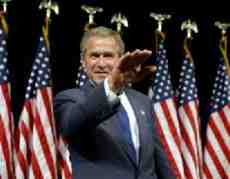Not Players, They Just Whore a Lot: Bush Inc. Helped Exxon Mobil Make $1 Billion a Day and $36 Billion in Profit in 2005
/
Oil Pimps When Bush came into office in January 2001, the average price of a regular gallon of gas was $1.46. Today, the price is $2.91, a 100 percent increase over the course of the Bush presidency. In just the last year alone, gas prices have increased more than 30 percent. Lawmakers have repeatedly called on Bush over the past year to investigate and punish price gouging. But because Bush has been resistant to those calls for so long, it is doubtful whether his recent pledges to act on price manipulation are merely political overtures or sincere efforts that will be carried through.
The Largest Profit of any Company in History: Last year Exxon Mobil earned one billion dollars a day and amassed 36 billion dollars in profits, a 42.6 percent increase from 2004. This was due largely to Hurricanes Katrina and Rita [MORE]. This is the highest profit of any company in history. Retiring Exxon chairman, Lee Raymond, is collecting "one of the most generous retirement packages in history," nearly $400 million. Royal Dutch Shell collected $23 billion in profits last year, a record amount for a British company. [MORE] Exxon Mobil has already made $8.4 billion in profits for in the first quarter of 2006, up more than seven percent from last year.
BUSH ADMINISTRATION LOOKS THE OTHER WAY ON PRICE GOUGING: Ninety percent of Americans, including members of Congress from both parties, say they believe price gouging is occurring at the pumps. Last week, Sen. Chuck Schumer (D-NY) called for a federal investigation. On Monday, Senate Majority Leader Bill Frist (R-TN) and House Speaker Dennis Hastert (R-IL) followed Schumer by sending a letter to the White House "asking Bush to direct the Justice Department and the Federal Trade Commission (FTC) to investigate possible price gouging by oil companies." Bush will instead ask the Justice Department and the FTC to send a letter to all 50 state attorneys general asking them to "stay on top of the issue." Under the Bush administration, the FTC has had a record of disregarding claims of price manipulation by gas retailers. Despite evidence in the aftermath of Hurricane Katrina that retail gas prices were rising unnecessarily faster than crude oil prices, the FTC investigation into price gouging "found no evidence of collusion among oil companies in the 2005 gas price surge. It said the culprits were high crude oil prices, record world demand and government regulations." The FTC Chair, Deborah Majoras, represented Chevron-Texaco and "other major oil and gas interests" prior to joining the administration.
BUSH HAS PASSED UP OPPORTUNITIES TO ACT: For over a year, the administration and the leadership in Congress have disregarded numerous opportunities to act on price gouging, but have failed to do so. In September 2005, during the aftermath of Katrina (when the average price of gas was at the same level it is today), Sen. Maria Cantwell (D-WA) offered legislation to improve the FTC's ability to protect consumers from price gouging. Cantwell tried to pass the legislation again in November but failed to attract sufficient bipartisan support, and has recently tried again to solicit Bush's support. Rep. Heather Wilson (R-NM) has led a similar effort in the House. Also last September, Sens. Jeff Bingaman (D-NM) and Bill Nelson (D-FL) introduced a bill that would have given federal authorities power to prosecute oil and gasoline suppliers who overcharge for motor fuels in a declared disaster area. Rep. Bart Stupak (D-MI) has introduced similar legislation in the House. The leadership in Congress refused to endorse or improve upon these recommendations until recently. "Feeling the political heat," Frist and Hastert have finally decided to take some action by sending a letter to Bush. From the American Progress Report












































































































































































































































































